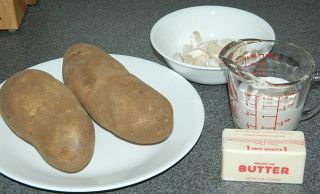 Start with two pounds (0.9 kg) russet potatoes (about two large ones), 20 cloves of garlic (with the skins on), 1/2 cup heavy cream, and 4 oz. unsalted butter. Russet potatoes are used because they are higher in starch than other potato varieties. If we used red potatoes or other waxy varieties, the mashed potatoes would not be as smooth and creamy.
Start with two pounds (0.9 kg) russet potatoes (about two large ones), 20 cloves of garlic (with the skins on), 1/2 cup heavy cream, and 4 oz. unsalted butter. Russet potatoes are used because they are higher in starch than other potato varieties. If we used red potatoes or other waxy varieties, the mashed potatoes would not be as smooth and creamy.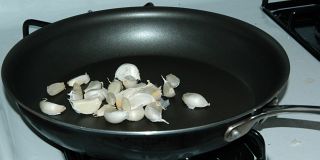 Toss the garlic into a pan and heat with a lid on over low heat. Any size pan will do as long as it has a lid.
Toss the garlic into a pan and heat with a lid on over low heat. Any size pan will do as long as it has a lid.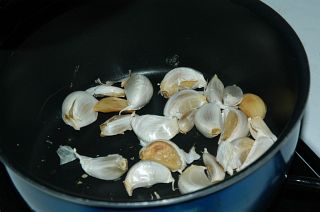 Keep the garlic over low heat and toss occasionally until the garlic cloves become darker in color and develop dark spots, about twenty minutes. Remove the garlic from the heat and leave covered for another twenty minutes. Once the garlic has cooled from the toasting (and mild steam), remove them and peel them. Cut off the woody ends of the garlic as well.
Keep the garlic over low heat and toss occasionally until the garlic cloves become darker in color and develop dark spots, about twenty minutes. Remove the garlic from the heat and leave covered for another twenty minutes. Once the garlic has cooled from the toasting (and mild steam), remove them and peel them. Cut off the woody ends of the garlic as well.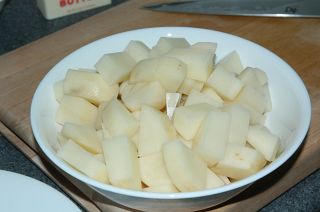 Meanwhile, bring enough water to cover the potatoes (about 3 quarts should be enough) to a boil. Wash, peel, and chop the potatoes into rough 1 inch cubes.
Meanwhile, bring enough water to cover the potatoes (about 3 quarts should be enough) to a boil. Wash, peel, and chop the potatoes into rough 1 inch cubes.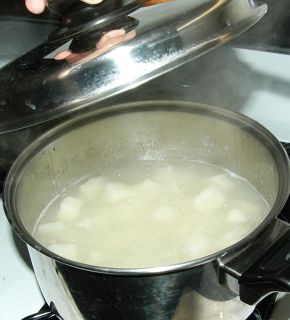 Boil the potatoes over medium heat for ten minutes (or until potatoes are soft throughout). While the potatoes are cooking, warm up the heavy cream either in a small pot or in the microwave oven. Don't boil the cream, just warm it up so it's not cold when we add it to the potatoes later.
Boil the potatoes over medium heat for ten minutes (or until potatoes are soft throughout). While the potatoes are cooking, warm up the heavy cream either in a small pot or in the microwave oven. Don't boil the cream, just warm it up so it's not cold when we add it to the potatoes later.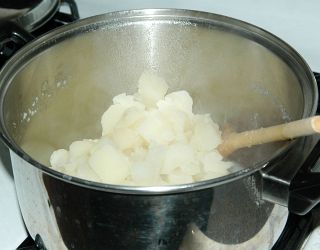 Drain the water from the potatoes. If the potatoes are wet or soggy, return the potatoes to the pot and cook over low heat while stirring cook off any extra water.
Drain the water from the potatoes. If the potatoes are wet or soggy, return the potatoes to the pot and cook over low heat while stirring cook off any extra water.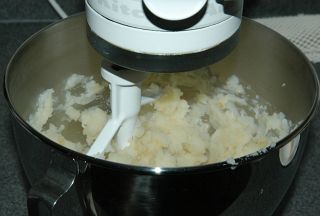 The potatoes can be mashed through a variety of methods (such as a potato ricer or a wire masher), but one of the creamiest methods is using an electric mixer. Pour the potatoes into the mixing bowl of your mixer and add the toasted garlic. I like running the garlic through a garlic press or chopping and mashing them first with a knife. Add the butter in chunks to the potatoes (the heat of the potatoes will melt the butter), and mix on low speed.
The potatoes can be mashed through a variety of methods (such as a potato ricer or a wire masher), but one of the creamiest methods is using an electric mixer. Pour the potatoes into the mixing bowl of your mixer and add the toasted garlic. I like running the garlic through a garlic press or chopping and mashing them first with a knife. Add the butter in chunks to the potatoes (the heat of the potatoes will melt the butter), and mix on low speed.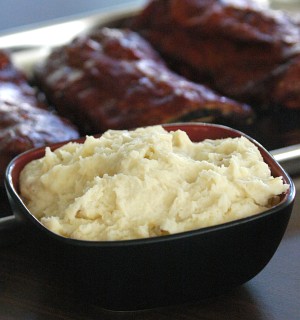 Add the heavy cream to the mixture and mix. Add salt and white pepper to taste. Once the mashed potatoes are creamy and smooth, stop mixing and remove to a serving bowl. Be careful not to over mix because the potatoes can become gummy when overworked. (If desired, the mashed potatoes can be dressed up with a dash of paprika and a sprinkling of fresh parsley.)
Add the heavy cream to the mixture and mix. Add salt and white pepper to taste. Once the mashed potatoes are creamy and smooth, stop mixing and remove to a serving bowl. Be careful not to over mix because the potatoes can become gummy when overworked. (If desired, the mashed potatoes can be dressed up with a dash of paprika and a sprinkling of fresh parsley.)Creamy Garlic Mashed Potatoes (serves 8)
| 2 lb. (900 g) russet potatoes | peel and chop into 1 in. cubes | boil until soft (10 min.) | drain | mix | mix | mix | season to taste and mix until smooth & creamy |
| 20 cloves toasted garlic | chop and mash | ||||||
| 4 oz. (110 g) butter | |||||||
| 1/2 cup (120 mL) heavy cream | warm | ||||||
| salt | |||||||
| pepper | |||||||
Toasted garlic
| Cloves of garlic | heat, covered, on low for 20 min. | let cool, covered, for 20 min. | remove skins and woody ends |
Related Articles

1. Microwave potatoes until soft.
2. Add milk/cream, butter, salt and pepper to a large bowl, microwave until hot.
3. Peel the potatoes and cut into chunks.
4. Rice potatoes into the bowl, stir well.
Done in 20 minutes, and you only have to clean one bowl and the ricer.
It's a tough subject to take on. EVERYONE you talk to will have an individual take on how they like the taters done. I personally could take skins or no, but my family hung me high. So, I leave the skins on for flavor and texture. Straus butter and heavy cream goes in with salt. Textury love. Top with bacon I've smoked over beef roasts, crumbled.
uuuuuuuhhhhh.
Biggles
It reminds me of interfacing with my boss, a college degreed scientist and chemist. A real pain in the ass. He can take sharpening a pencil and make it an all day affair. He figures the wheel needed reinventing. At least now it has only 9 sides.
Biggles
I have to admit that it is a little odd. It would probably be less confusing if I didn't allow non-registered users to comment at all. Otherwise, it's just like logging into Blogger before you post, except you have to log into Cooking For Engineers to post (as yourself).
I made a modification so now when you login, it should keep you on the same page where you hit reply... hopefully it won't be too weird.
Can anybody help?
CBRetriever
I think it's a fast boil and throwing the potatoes into a bowl of iced water to shock them, which stops the cooking. I don't know for sure, but this sounds most logical based on what I know about French cooking (which is experimental food science based on hundreds of years of culinary tradition).
Since garlic doesn't really like the Maillard reactions, I've found it easier and more convenient to roast the garlic in the oven (350° F for at least 20 minutes) with a little olive oil (not extra virgin). And I've found that the taste is cleaner and better if you remove the skin before roasting and crush them with the knife prior to roasting.
And I've found that I like the texture of the potatoes cut into smaller pieces (around 1/2 inch) and boiled in heavily salted water. I think of it like cooking pasta. Large volume of brine. Small volume of potatoes.
A small white onion pureed in the food processor adds a nice touch, too, in my opinion.
-NLA
http://www.bbc.co.uk/food/tv_and_radio/fullonfood_potato.shtml
If you have a lot of garlic available (i.e., just came back from Costco), then it is useful to peel and "poach" a lot of garlic at one time, and keep the extra in the oil, in the fridge, till you have some other use for it. Use a small pot, and don't heat the oil too hot - you don't want to brown the garlic, just soften it up.
How much oil do you use? Does the oil cover the garlic or does the garlic simply sit on top of the oil?
The garlic is good for other uses, such as a spread on bread, in other sauces, and with veggies - we are about to start to get fresh beans out of the garden, and after briefly steaming them, we quickly saute them in the garlic oil and a smashed close or two of the softened garlic. The oil can also be used on salads.
--joe
Does briefly cooking the garlic lessen/eliminate that concern? Or should the garlic in oil be used within a few days, weeks or ?
You're so right about the unsung glories of superb "side" dishes. Last Easter, my "Sweet Potato aux Peeps" was the pride of the table.
A holiday tradition is hatched
Sissy Willis
Also, try adding a couple of table spoons of olive oil - helps with the texture.
Tried to register, but gave up............ haha now i see why this blog is called cooking for "engineers"......... very funny!!
Generally use milk and plenty of butter rather than cream and to get very fluffy mashed potatoes you mash with a normal masher then wisk to beat in air.
Does briefly cooking the garlic lessen/eliminate that concern? Or should the garlic in oil be used within a few days, weeks or ?[/i:c0ac96e492]
aileen, botulism and other nasties don't grow in oil-- if there is enough oil in the jar to cover the garlic completely and the jar is well-capped, the result is preserved garlic and an infused oil. you can reheat / recook if it makes you feel better (feeling better is always good!), but it's not necessary.
Actually, from what I've read that's not quite true. The bacteria that produces botulism toxin (Clostridium botulinum) grows best in a low oxygen or anaerobic (zero oxygen) environment. Garlic infused oils are a potential source of botulism if the garlic was not cooked enough (killing the bacteria) or the oil does not contain sufficient acid to inhibit the growth of the bacteria. For this reason, garlic infused oils should be refrigerated for safety unless the manufacturer really knew what they were doing.
Fortunately, heat does destroy the botulism toxin, so bring the food above boiling (212°F) for at least ten minutes to be safe.
I thought cooking might mitigate that possibility, but wasn't sure if the earlier post of briefly cooking the garlic was enough of a safety measure.
Probably the best case scenario is to cook the garlic enough to kill possible "bugs" before storing the garlic-oil mixture in the fridge and using as soon as possible. :)
Sorry if this was too much info, especially since I could not give a definitive answer to the question.
Karen
I really liked the idea of rxc's to make an oil/garlic concoction when faced with a Costco load o' garlic, so your suggestion gives me more confidence to try it! :)
And I am another person who puts in a little sour cream when making mashed potatoes...those poor potatoes are so healthy until we add all the goodies (butter, salt, sour cream...) ;)
My way is quite similar to the recipe featured here. I highly suggest rinsing your cubed potatoes in cold water through a colander prior to cooking. This washes off extra starch and brings you delightfully fluffy results later.
After you cook the taters, drain them well. This is important.
Heat your milk (or cream, half and half, whatever) and completely melt butter before adding to the cooked potatoes. Two reasons (that I can think of) support this: first, to avoid overmixing by making the hot potatoes melt your butter for you; and, second, the potatoes absorb better and more quickly the hot liquids (because they are hot, I guess).
Now, many of you scoffed at the thought of using a mixer to mash the cooked potatoes. I wouldn't do it any other way, as long as I can use my flat paddle attachment (never use the whip or wisk attachment or even the beaters of the hand-held mixers).
I normally use low-fat milk and smart-balance type of margarine and a small amount of real butter. But for a holiday or other special occation, for the liquid i will use a equal parts of helf-and-half and real cream and, of course, all real butter. I cannot tell you the amounts, because I just eyeball it.
From the National Restaraunt Foundation ServSafe textbook regarding major foodborne illnesses (botulism) and food involved in outbreaks:
"...untreated garlic and oil mixtures..."
Later when discussing botulism:
"Botulism...is so dangerous that people have died from just tasting and spitting out contaminated food."
Based on that information , I have started throwing away my homemade garlic infused oil after 2 days if I haven't used it all.
On a happier note, start your potatoes in cold water and bring them to a boil with the water. I have misplaced my notes on the exact reasoning for this, but it has to do with bringing the starch in the potatoes up to temp gradually rather than over-cooking the starch on the outer edges of your pieces while waiting for the potatoes to become tender in the middle. It takes a lot longer with this method, but they come out very creamy.
For a bit of extra kick, try substituting buttermilk for some or all of the cream.
Karen
The reason one should always!!!.. start their potatoes in cold water... Is for the simple reason of evenly cooked potatoes. If you plce the potatoes in cold water , then turn up the heat, the whole mass of the potato will heat up evenly and cook evenly. But if you would put your potatoes into boiling water the outside of the potatoes will cook faster then the cold interior of the potatos, resulting in undercooked insides and mushy overcooked outsides usually resulting in mirky startchy water. A loss in nutrients and potato.
i like to season potatos after to make sure not to much salt is in the boiling water. but could add herbs, bay leaf, whatever.
I usually don't cover the pot either, just have enough water to cover the potatoes, find it nice to drain the potatoes and let steam excess moisture ( the moisture is just water and you want to replace it with good stuff like cream, garlic, butter, etc.)
i was told it is better to mix in your cream and seasoning first till just combined.. then finish with the butter after.. as the potatoes will absorb lots of the cream... and the butter isn;t lost.. it is accented better i the dish if added at the end.
It grows in soil, so garlic is especially problematic.
The worst part is the way it kills you. The toxin paralyzes your muscles and you slowly suffocate.
I haven't tried pre-roasting the garlic (sounds delicious though!), but boil peeled, crushed (slightly) clove with my potatoes and a little bit of chicken broth and use a little of that liquid along with sour cream and plenty of butter to mash with them.
Amazing, isn't it, how many different tricks and variations there are for an old standard like mashed potatoes?
Thanks for your fantastic site!
~Lyss
Do I just triple all of the ingredients?
Do the cooking times need to be extended?
Much obliged,
ChrisLindbergh
Chris -
essentially yes - I would advise:
do not add all your liquids in one batch - the amount of moisture remaining on the (cooked) potatoes prior to mashing affects how much liquid/cream you need for the right consistency.
cooking time: going by the only the clock is not recommended. be sure the chunks of potato are reasonably the same size (even cooking) and go for "fork tender" - use something like a caving fork or an i ce pick, not a dinner fork - stick a potato chunk, lift it vertically out of the water, if it falls back into the pot, potatoes are ready. check several "spots" around the pot...
with that volume, I'd be temped to drain the pot, spread the chunks out on a big sheet to allow the excess moisture to evaporate.
and don't forget to taste as you're going along - the "strength" of your garlic and salt amounts in particular.
Sorry, just found this site so I assume your potluck is over already, but for future reference I will post this. We have done this kind of recipe for very large groups, I use a thin bladed pointed knife to test how done the potatoes are. When they are done we drain them in a large colander and mash them by hand in the pots we cooked them in, this makes potatoes with more lumps and texture. They could be whipped in a mixer or put through a ricer if you want creamer potatoes. We place them in warming trays and store them in a Cambro or warmer to keep them hot until served.
For the kind of thing you are talking about, a 12 quart pot would work well. Wrap some beach towels around the pot to keep it hot.
that aside, a food processor is likely to turn them into glue before you can switch it off.
potato is about 2% protein; legumes roughly ten times that.